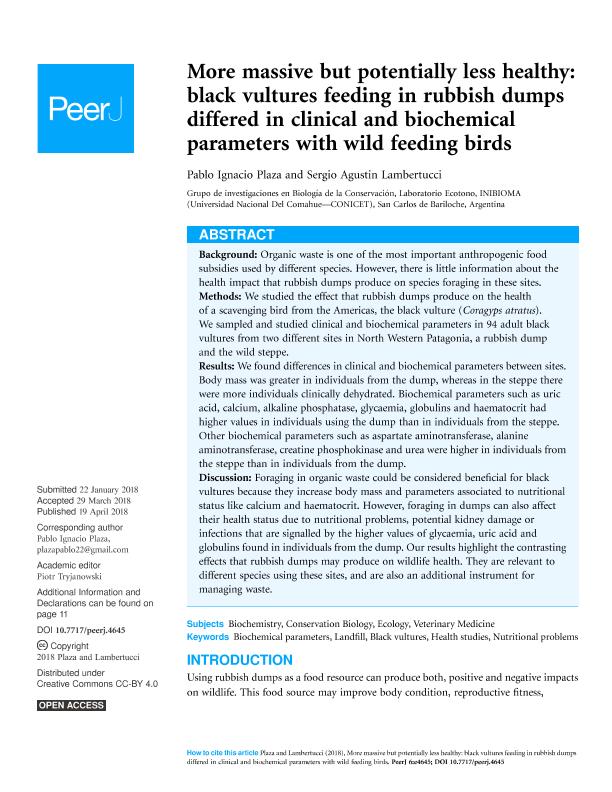Artículo
More massive but potentially less healthy: Black vultures feeding in rubbish dumps differed in clinical and biochemical parameters with wild feeding birds
Fecha de publicación:
04/2018
Editorial:
PeerJ Inc.
Revista:
PeerJ
ISSN:
2167-8359
Idioma:
Inglés
Tipo de recurso:
Artículo publicado
Clasificación temática:
Resumen
Background: Organic waste is one of the most important anthropogenic food subsidies used by different species. However, there is little information about the health impact that rubbish dumps produce on species foraging in these sites. Methods: We studied the effect that rubbish dumps produce on the health of a scavenging bird from the Americas, the black vulture (Coragyps atratus). We sampled and studied clinical and biochemical parameters in 94 adult black vultures from two different sites in North Western Patagonia, a rubbish dump and the wild steppe. Results: We found differences in clinical and biochemical parameters between sites. Body mass was greater in individuals from the dump, whereas in the steppe there were more individuals clinically dehydrated. Biochemical parameters such as uric acid, calcium, alkaline phosphatase, glycaemia, globulins and haematocrit had higher values in individuals using the dump than in individuals from the steppe. Other biochemical parameters such as aspartate aminotransferase, alanine aminotransferase, creatine phosphokinase and urea were higher in individuals from the steppe than in individuals from the dump. Discussion: Foraging in organic waste could be considered beneficial for black vultures because they increase body mass and parameters associated to nutritional status like calcium and haematocrit. However, foraging in dumps can also affect their health status due to nutritional problems, potential kidney damage or infections that are signalled by the higher values of glycaemia, uric acid and globulins found in individuals from the dump. Our results highlight the contrasting effects that rubbish dumps may produce on wildlife health. They are relevant to different species using these sites, and are also an additional instrument for managing waste.
Archivos asociados
Licencia
Identificadores
Colecciones
Articulos(INIBIOMA)
Articulos de INST. DE INVEST.EN BIODIVERSIDAD Y MEDIOAMBIENTE
Articulos de INST. DE INVEST.EN BIODIVERSIDAD Y MEDIOAMBIENTE
Citación
Plaza, Pablo; Lambertucci, Sergio Agustin; More massive but potentially less healthy: Black vultures feeding in rubbish dumps differed in clinical and biochemical parameters with wild feeding birds; PeerJ Inc.; PeerJ; 2018; 4; 4-2018; 1-15
Compartir
Altmétricas




